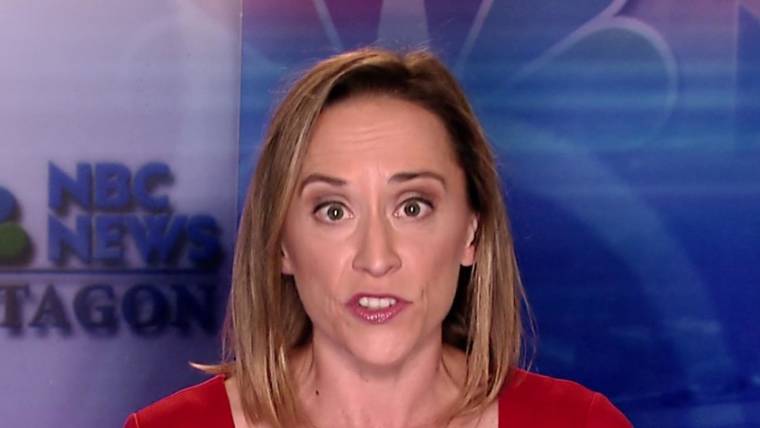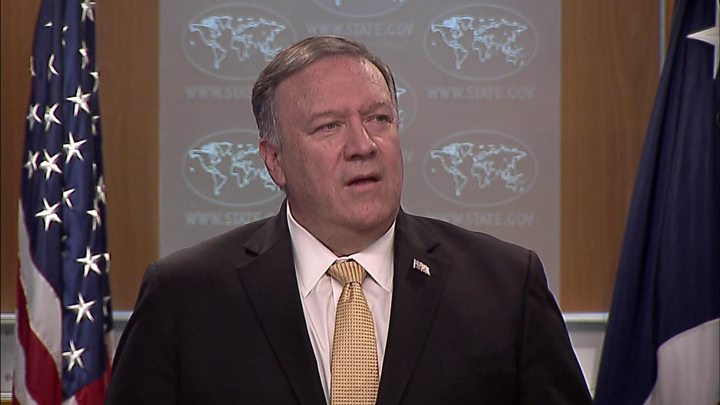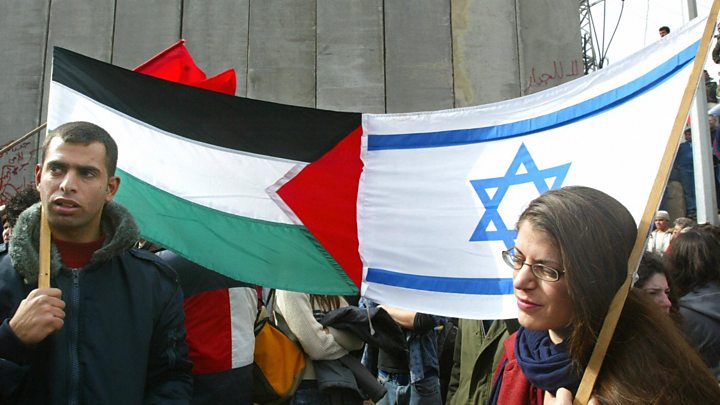Tyrone Siu
Reuters
A protester is detained by riot police while attempting to leave the campus of Hong Kong Polytechnic University during clashes on Monday.
HONG KONG — Hundreds of pro-democracy protesters were surrounded by riot police Monday inside a besieged Hong Kong college campus, as almost six months of intensifying anti-government unrest appeared headed for a bitter and perhaps bloody climax.
Police blocked exits to try to coax exhausted protesters out of the Polytechnic University on Monday after a night of clashes with students. When some attempted to leave, officers forced them back with tear gas and rubber bullets and made dozens of arrests. As night fell, and with explosions and black smoke emanating from the grounds, police repeated demands for the demonstrators — some of whom have been there for days — to surrender.
As protests raged in Hong Kong on Nov. 17, a police vehicle being used to clear a bridge was hit by a Molotov cocktail and forced to retreat.
At rallies across the city, people expressed support for the trapped students. “Save PolyU, save the students!” they chanted. In the densely packed streets adjoining the university, demonstrators using umbrellas as shields edged toward police lines and were repulsed with tear gas.
[Hong Kong police move on university campus, threaten live rounds, retreat before growing flames]
Unable to forge a political settlement to end an uprising that has shattered Hong Kong’s reputation as a stable base for business, the city’s embattled leadership has appeared increasingly paralyzed even as it has clamped down harder on demonstrators.
The spiraling violence and heavy-handed crackdown have sharpened concerns about China’s “one country, two systems” framework under which Hong Kong, led by Chief Executive Carrie Lam, is supposed to enjoy relative freedoms and autonomy from Beijing until 2047.
Ng Han Guan
AP
Police in riot gear move through a cloud of smoke at the Hong Kong Polytechnic University on Monday, as the city’s months-long political crisis reached a boiling point.
At the Polytechnic University, a front-line protester, who declined to give her name out of fear of retribution, said people were frantically trying to find a way out of the campus in the face of the police encirclement. Protesters who broke inside a doctor’s office left blood around the room — and a note apologizing.
Some 500 to 600 students remain trapped, said Derek Liu, head of the university’s student union. PolyU’s president, Jin-Guang Teng, in a video statement urged students to hand themselves in.
Nearby, broken bricks, scaffolding and fences were strewn across the streets of the Tsim Sha Tsui shopping district.
[Behind the barricade, Hong Kong protesters turn a university into a fortress]
“We feel very disappointed about the government,” said Peter, a 30-year-old clerk, who was dressed in business attire and declined to give his full name as he watched tear gas billow out from an alleyway. “There are many ways to solve the problem, like dialogue. The government hasn’t done anything to solve the issue, instead forcing protesters to violence.”
Some of the city’s working men and women are using their spending power to help front-line protesters confront police during the demonstrations in Hong Kong.
At a news conference, regional police commander Cheuk Hau-yip said officers had given protesters “enough time and enough warnings” to disperse.
He said there was no plan for police to break into the campus for now. “If they surrender and come out, we will arrange the appropriate medical help for them,” Cheuk said.
Thomas Peter
Reuters
Protesters attempt to leave the campus of Hong Kong Polytechnic University during clashes with police on Monday.
The violence on campus and the police response point to a lack of leadership and confusion in both Hong Kong and Beijing, said Minxin Pei, an expert on Chinese politics at Claremont McKenna College in California. Even as police threatened to use live rounds to crush the occupation at Polytechnic, Lam was notably absent from public view all weekend, at a time when Chinese leader Xi Jinping was traveling overseas.
“Carrie Lam really does not want to be seen as responsible for any large-scale violence at this point, as Beijing will make the ultimate decision whether to escalate to use live rounds,” Pei said. “I don’t think Beijing wants to cause massive bloodshed, but the decisions made in Beijing over the next 48 hours will be crucial.”
In a new setback for Lam, Hong Kong’s High Court ruled Monday that the government’s use of a British colonial-era emergency ordinance to ban face masks at public gatherings was unconstitutional. Lam had introduced the measure to aid police in identifying protesters and effectively expand powers of arrest.
Lam visited an injured police officer in the hospital on Monday, but she did not make public remarks, and her office did not respond to a request for comment. In a message on Facebook later, she condemned protesters and urged them to obey police.
The clashes renewed concerns that the Hong Kong government might suspend local district elections Nov. 24. Patrick Nip, a Hong Kong official responsible for mainland affairs, said the vote depended on protesters’ halting violence.
With the crisis escalating, fears are mounting that China’s ruling Communist Party might attempt a lethal intervention. In 1989, soldiers opened fire in Tiananmen Square, killing hundreds, perhaps thousands, of student demonstrators.
Thomas Peter
Reuters
A riot police officer points a gun at protesters attempting to escape the campus of Hong Kong Polytechnic University.
Chinese state media, meanwhile, urged harsher measures. In a commentary Monday on Weibo, China’s version of Twitter, Hu Xijin, editor of the Global Times tabloid, called for Hong Kong police to be authorized to use rifles against demonstrators, who have armed themselves with molotov cocktails, bows and arrows, bricks and other weapons. Snipers should use live ammunition to take out armed demonstrators, Hu said, adding that “if there are rioter deaths, police do not have to assume legal liability.”
In an English-language editorial, the China Daily said Xi had urged Hong Kong’s government to take “firmer action” to restore order, in his strongest statement to date. “The [Hong Kong] government, which has taken a relatively soft line up to now, should shoulder its responsibility to safeguard the lives and well-being of Hong Kong’s law-abiding residents and take more decisive measures to counter the violence and uphold the rule of law,” the editorial said.
Pressured by a trade war with the United States, criticism of China’s repression of ethnic minorities in Xinjiang and a slowing domestic economy, Xi has sought to project a tough line on Hong Kong. But a bloody crackdown would play out under the glare of the world’s media and further inflame worries about Hong Kong’s loss of autonomy.
China’s Foreign Ministry said Monday that no one should underestimate Beijing’s determination to safeguard China’s sovereignty and Hong Kong’s stability.
China’s Defense Ministry also weighed in, noting the presence of the People’s Liberation Army garrison in Hong Kong that over the weekend participated in the removal of debris and barricades left by protesters.
“The PLA Hong Kong garrison is determined, confident and capable of protecting national security, development interests and the long-term prosperity and stability of Hong Kong,” the ministry said.
Thomas Peter
Reuters
A protester is detained by riot police on Monday.
The protests flared in June over a now-abandoned proposal to allow criminal suspects to be extradited to mainland China. But the movement has grown into a wider pushback against China’s growing reach into Hong Kong, encompassing demands for full democracy and police accountability.
Emily Lau, a pro-democracy politician, said Lam was unable to do anything because “she is waiting for orders from Beijing.” But Xi was caught in a power struggle, she said, and his enemies within the party were “happy to see Hong Kong burn” because it made him appear unable to control the situation.
Among the protesters, Hong Kong’s general population, the local government, and central authorities in Beijing, “the weakest of the four players is our government,” Jasper Tsang, the former head of Hong Kong’s legislature who belonged to the pro-Beijing camp, said over the weekend as he described a city in paralysis.
“The [Hong Kong] government: It is incapable of doing anything; Carrie Lam has admitted it,” Tsang told the Hong Kong Free Press in an interview. “There is no strong decision-making mechanism. [Lam] listens to the hard-liners, and there is no politician who could take responsibility.”
Samson Yuen, assistant professor of political science Hong Kong’s Lingnan University, said Hong Kong’s government has been absent throughout the crisis.
“It would actually be quite surprising it they came out at this moment and suddenly offered a political solution,” he said. “It’s almost designed to be like this, from the moment they decided not to negotiate with protesters. That just means a suppressive outcome.”
Shih reported from Beijing. David Crawshaw contributed to this report.
Read more
Behind the barricade, Hong Kong protesters turn a university into a fortress
What’s happening in Hong Kong? Some key questions, answered.
As unrest paralyzes Hong Kong, college students from elsewhere begin to evacuate
Today’s coverage from Post correspondents around the world
Like Washington Post World on Facebook and stay updated on foreign news
Let's block ads! (Why?)
https://www.washingtonpost.com/world/hong-kong-protesters-make-last-stand-as-police-close-in-on-besieged-university/2019/11/18/7f614012-09c8-11ea-8054-289aef6e38a3_story.html
2019-11-18 11:45:00Z
52780435950054



